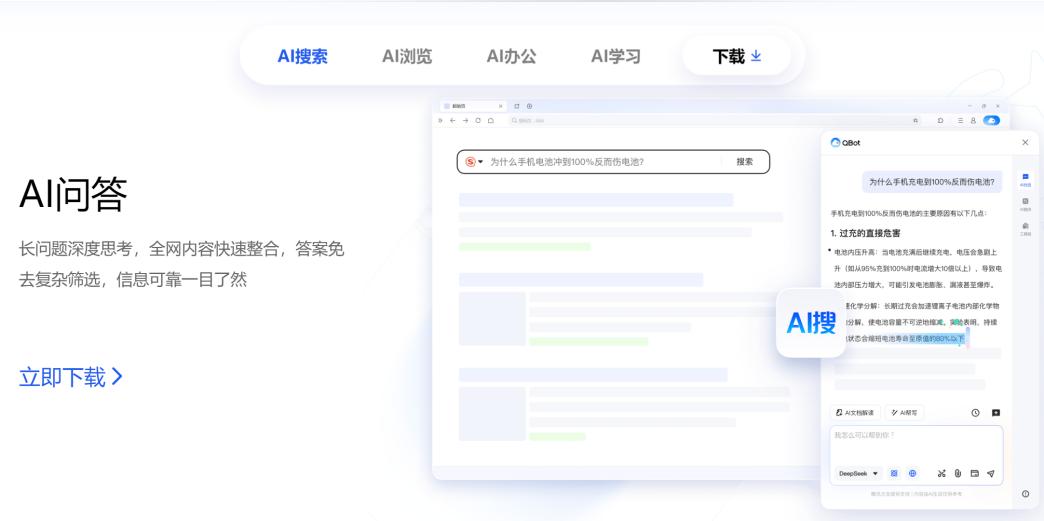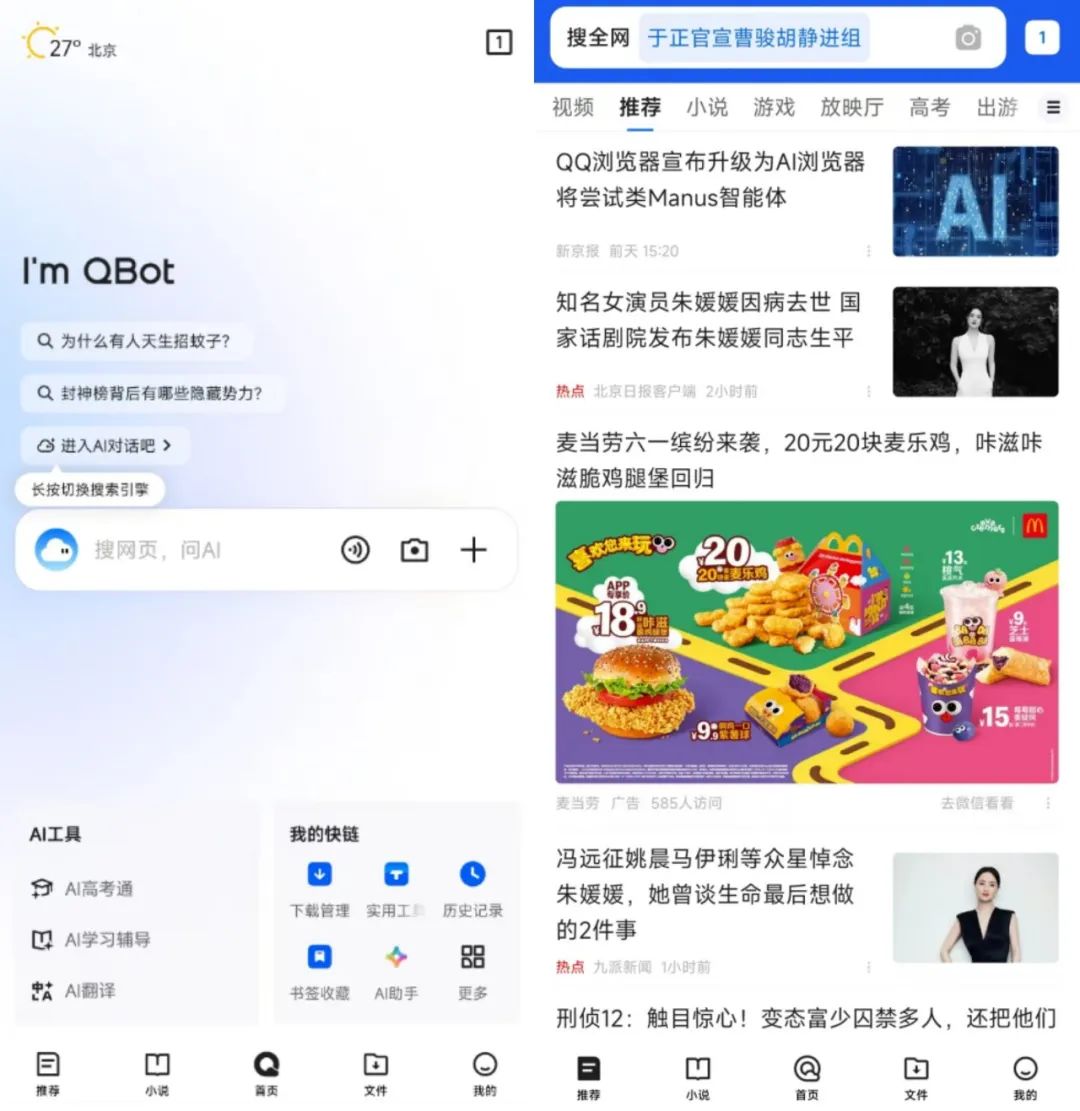
Tencent and Alibaba AI to C’s carriages and horses are officially matched.
On May 19, QQ Browser, a product of Tencent CSIG (Cloud and Smart Industry Business Group), announced that the product was officially upgraded to an AI browser, launching a new AI QBot, and equipped with Tencent Hunyuan and DeepSeek dual models.
Since then, Tencent CSIG has gathered two major AI to C products – Tencent Yuanbao and QQ Browser, forming a confrontation with Alibaba’s products of the same type as Tongyi and Quark. The core cadres of the two major AI to C companies, Ali Wu Jia and Tencent Wu Zurong, also happened to stage a “double Wu” showdown.
Perhaps in order to overwhelm Alibaba on the AI battlefield – in February this year, Quark announced that its products would be fully upgraded to AI search, bringing a new AI experience to 200 million users; After the QQ browser announced the upgrade, Tencent’s public relations director Zhang Jun immediately forwarded the relevant content and wrote: “QQ browser has been fully upgraded today, and 400 million users have entered the AI era at the speed of light.” ”
Previously, Tencent may have tried to build WeChat into the first entrance to AI to C. For example, embed AI search options in WeChat search. However, due to its social product positioning, it is difficult for WeChat to completely transform into an AI product. Now that Yuanbao and QQ Browser have been assigned to CSIG, they have finally freed up their hands and feet – they can rush to the front as a commando of Tencent AI to C without any baggage.
At present, in order to compete for the commanding heights of AI, Tencent and Alibaba have done their best. According to the financial report for the first quarter of this year, Alibaba’s capital expenditure was 24.6 billion yuan, a year-on-year increase of 121%; Tencent’s capital expenditure was 27.5 billion yuan, a year-on-year increase of 91%, of which the capital expenditure of AI-related business was 23 billion yuan, accounting for more than 80%. A Tencent employee said: “What kind of AI people have to rise to pull up the company’s salary by 30%? ”
This head-to-head encounter in AI search, in the context of today’s major manufacturers taking AI as the strategic focus, is by no means an accidental crash – it is more like a premeditated arrangement, behind which is the unavoidable battle between Tencent and Alibaba on the AI to C track.
01 Tencent Alibaba staged a “Double Wu” showdown
Since the rapid outbreak of online demand for Tencent Meetings, Wu Zurong’s attention within Tencent has been rising.
First, Tencent pulled AI application ingots from TEG (Technology Engineering Business Group) and transferred them to CSIG, with Wu Zurong as the head. Since then, Tencent has invested heavily in Yuanbao and built it into a star-level business within Tencent in one fell swoop. On March 19, Tencent President Martin Lau revealed at the annual earnings conference that the number of daily active users of Yuanbao has soared by more than 20 times in nearly a month.
Then Tencent assigned PCG’s mature products to CSIG and handed them over to Wu Zurong in charge of the relevant search department. According to the “First Financial News” report, in February this year, while QQ Browser and Sogou Input Method were included in CSIG, the search application department, which originally belonged to the PCG information platform and service line, was also included in CSIG and reported directly to Wu Zurong, the person in charge of Tencent Yuanbao.
Other application departments such as the Platform Business Department, Content Business Department, Reading Business Department, Commercialization Business Department, Data and Technology Platform Department and other business units in the same service line did not mention the adjustment reporting relationship. According to Leifeng.com, in this change, He Yijin, head of Tencent PCG’s trust line, while PCG continues to be responsible for Tencent News, also follows the business changes and leads the part of the business merged into CSIG to report to Tang Daosheng.
This means that the AI transformation of QQ Browser may be a precise cooperation within Tencent – the search application department in charge of Wu Zurong is responsible for AI search, counting ingots, Alibaba Tencent’s AI to C battle, has also officially formed a “double Wu” showdown pattern.
“Shuangwu” are all group warriors who are good at fighting tough battles. Wu Jia is a graduate of Alibaba School, and has successively managed products such as Quark, UC Browser, and Shuqi Novel in Alibaba, single-handedly bringing out Quark Browser and entering the list of Alibaba’s Four Tigers. After the epidemic, in order to cope with the surge in user demand, Wu Zurong led the team to “sleep for several days and nights”, expanding the capacity of 100,000 cloud hosts in 8 days, and it took less than a year to go from cold start to more than 100 million users.
From the QQ browser closely following the transformation of quark into AI search itself, we can see the correctness of Wu Jiashu’s transformation of quark into an AI super box – being imitated by the industry itself is a great success.
At this stage, from the perspective of the group’s organizational structure, Quark’s strategic position is higher than that of QQ Browser. As a strategic innovation project of Alibaba, Wu Jia has made his debut as a “Quark CEO” this year – in Alibaba, being able to list the CEO’s business separately means that not only the strategic position has been improved, but also greater autonomy and resource integration authority. This is not a routine operation, but a signal to focus on betting at the group level.
QQ Browser is still under CSIG, and the freedom of resource scheduling and decision-making is not prominent compared to Quark.
From the perspective of transformation and landing, Quark has almost completely thrown off the shell of traditional browsers and directly reconstructed it into an AI entrance, while the AI function of QQ browser is more like a plug-in plug-in on the old architecture, and the experience is slightly fragmented. Behind this, it not only reflects the radicality of the product, but also reflects the internal voice and strategic chips of the person in charge.
How to fight this AI to C battle and who can win is not just as simple as winning or losing the product, it is likely to directly affect the upward channel of the two generals surnamed Wu in their respective factories – the winner may be able to get the next promotion ticket, and the loser may even have to change the battlefield.
In fact, Tencent Alibaba, AI to C crashed head-on. It’s not a coincidence, it’s fate. One pushes QQ browser and ingots into battle, and the other presses quarks and Tongyi to grab the position, on the surface it is a product upgrade, but in fact it is the start of a new round of user entrance battle – search, content, and tools meet across the board.
02 Tencent redoes “Quark”
For example, on the APP side, QQ Browser adopts the design of the AI search box in the center, which also adopts a minimalist style with Quark, the difference is that the guiding word in the Quark AI super box is “tell me the questions and tasks”, while QQ Browser is “search the web page, ask AI”.
The camera function on the right side of the QQ browser search box is the upgraded Scan King function, which can intelligently identify objects, extract text, etc.; The plus sign on the right can enter the QBot interface, where users can directly talk to AI, upload images, documents, etc. for analysis, and can also assist in writing, one-click translation, etc.
The difference is that compared to Quark’s web page search and deep thinking, QBot equipped with Tencent’s hybrid and DeepSeek dual models is supported by Tencent’s content ecosystem and can retrieve WeChat official account sources.
In addition, QQ Browser integrates agents similar to Manus, and the first batch of four agents are AI college entrance examination pass, stock assistant, download assistant, and update assistant. Taking the AI College Entrance Examination Pass as an example, the “Market Phenomenon” experience found that QQ Browser’s AI College Entrance Examination Pass provides functions such as score line query in previous years, college entrance examination schedule query, question solving and Q&A, and composition tutoring.
The biggest difference between the two products is that Quark basically subverts the traditional search experience with AI super boxes, while QQ Browser is relatively restrained, and the AI search box is more like an embedded plug-in.
Taking the PC experience as an example, QQ Browser adopts a dual-screen search result feedback design of traditional search + AI search, in which traditional search results are dominant, and AI search is presented in the form of split screen on the right.

On the mobile side, QQ Browser divides traditional search and AI search boxes into two entrances: “Recommendation” and “Home”. The “Market Phenomenon” experience found that the user stayed on one of the pages when they last exited will be prioritized when they open it the next time.

In other words, QQ Browser has not replaced the traditional search entrance on both ends of the mobile web, and even some experiences are still dominated by traditional search.
In an interview with “36Kr”, Wu Jia once said that AI super boxes will not subvert traditional search:
“Traditional search will be part of the superbox, and there are always some scenarios that are very direct and can be satisfied with a short search. You have to search Taobao for me, search for the weather, and give me the weather conditions, these needs don’t need to be thought too deeply. But the model of traditional search engines is really not needed, and these needs will be taken over by the form of super boxes. ”
However, from the perspective of actual user experience, due to deep thinking “pervasive”, some users reported that Quark’s AI super box function was radical, which destroyed the usage habits.
To some extent, QQ Browser has learned the lesson of being too hasty when Quark transformed into an AI superbox, completely sacrificing the traditional search experience. Liu Hanbo, product leader of QQ browser, explained: “We don’t just remove the navigation, because many users will still go to the navigation to address, click on fixed websites or consume some content, and we leave the choice to the user.”
In addition, due to the fact that there have been many advertisements in the product in the past, QQ Browser cannot completely abandon traditional search and transform into a pure AI search box like Quark.
From the perspective of design layout, QQ browser is similar to the height of mobile Baidu. Although in terms of publicity, Baidu APP has played the slogan of AI intelligent search, but in the actual experience, recommendation flow + traditional search is still the main interface of Baidu on mobile phones, and AI search/dialogue only exists as a supporting function. while mobile Baidu has mature recommended streaming content and provides advertisements like QQ browser.
In terms of product user scale, Quark claims that the monthly active user scale has reached 200 million, while QuestMobile data shows that as of the end of the fourth quarter of last year, the number of monthly active users of QQ browser reached 400 million, making it the browser product with the largest number of users in China.
Correspondingly, QQ Browser is also more mature in terms of commercialization. Compared with Quark’s current ad-free business that only uses paid memberships as a means of commercialization, QQ Browser not only includes tool members, Tencent Video members, Novel Reading Members, and Tencent Sports Membership recharge functions, but also has open-screen advertisements and recommendation page advertisements.
In contrast, the advantage of QQ Browser lies in the user base, and the disadvantage is that the advertising content affects the user experience and the lack of user mind. The ring of this “Double Wu” showdown has been set up, and it depends on how the two sides advance.
Resources:
What signals have Tencent’s AI product changes released?—— Lei Feng.com
Tencent’s AI application changed formation, and QQ browser and Sogou input method were transferred to CSIG – Yicai




